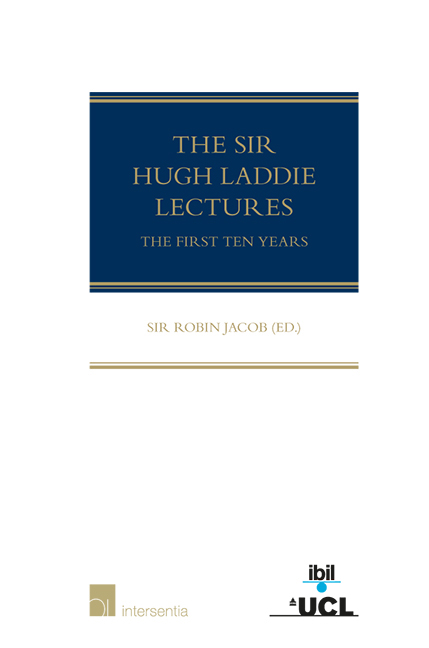Book contents
- Frontmatter
- Preface
- Contents
- List of Contributors
- The Insatiable Appetite for Intellectual Property Rights
- The Function of a Trade Mark: Hugh Laddie and the European Court of Justice
- From National Patent Litigation to a European Patent Court: A Dream, A Wish, or Soon, Reality?
- Killing the Goose that Laid the Golden Egg: Too Many Trade Marks? Use and Intention to Use in EU Trade Mark Law
- The Growing Imperative to Internationalise the Law
- Community Trade Marks: A Swiss Cheese?
- The Culture of the Public Domain: A Good Thing?
- IP and Advocacy
- Patents and Populism
- Towards a Global Copyright Law?
- Apologia Pro Vita Sua: A HiFi Retrospective and a Modest Prospective
- About the Editor
Killing the Goose that Laid the Golden Egg: Too Many Trade Marks? Use and Intention to Use in EU Trade Mark Law
Published online by Cambridge University Press: 09 November 2019
- Frontmatter
- Preface
- Contents
- List of Contributors
- The Insatiable Appetite for Intellectual Property Rights
- The Function of a Trade Mark: Hugh Laddie and the European Court of Justice
- From National Patent Litigation to a European Patent Court: A Dream, A Wish, or Soon, Reality?
- Killing the Goose that Laid the Golden Egg: Too Many Trade Marks? Use and Intention to Use in EU Trade Mark Law
- The Growing Imperative to Internationalise the Law
- Community Trade Marks: A Swiss Cheese?
- The Culture of the Public Domain: A Good Thing?
- IP and Advocacy
- Patents and Populism
- Towards a Global Copyright Law?
- Apologia Pro Vita Sua: A HiFi Retrospective and a Modest Prospective
- About the Editor
Summary
LECTURE
Good evening. It is an enormous pleasure, first, to have been asked by Sir Robin Jacob to tackle this talk, and secondly, to be introduced by the Rt Hon LJ Mummery, two giants and legends in the field of intellectual property. There were, I admit, several times during the course of the past few months when I have doubted my sanity in accepting the challenge of speaking. I say challenge because I wanted to pick a topic that I thought just might exercise the late, great Sir Hugh Laddie's very considerable brilliance and, sometimes, ire.
I have chosen a topic which I think fits the bill and I hope over the next 40 minutes or so that you will find it of some small interest. I was reluctant to choose something so closely associated with Hugh, such as football scarves, or the ‘ideal international court’, such as the ECJ (now the CJEU), as you can imagine, or even how judges of such courts, such as – at times – myself, operate, for fear of doing him or me a huge injustice. Given, however, that this is an institution of very considerable learning (although my heart is still very close to LSE), I wanted also to choose a topic which might encourage further investigation and research by advanced students. So, I hope this talk, which only touches the chosen topic in a surface manner, will encourage some student to read further, and perhaps tackle some research.
My topic, when I finally chose it, concerns ‘use and non-use of a trade mark’, why there should be use, why in traditional legislation – at least on the common law side – there has always been a requirement for use (or intention to use), at the stage of registration, and why I think that this requirement is – wrongly – being allowed to slip in importance in the new EU world in which we all currently live, including the ever-expanding EU world of 27 members – and counting.
I hope also to be at least a little controversial, because I think it would be no compliment to Hugh if I simply trundled along through traditional lines, and statistics, and made a few banal, mundane and quite useless comments. So bear with me.
- Type
- Chapter
- Information
- The Sir Hugh Laddie LecturesThe First Ten Years, pp. 51 - 76Publisher: IntersentiaPrint publication year: 2019



